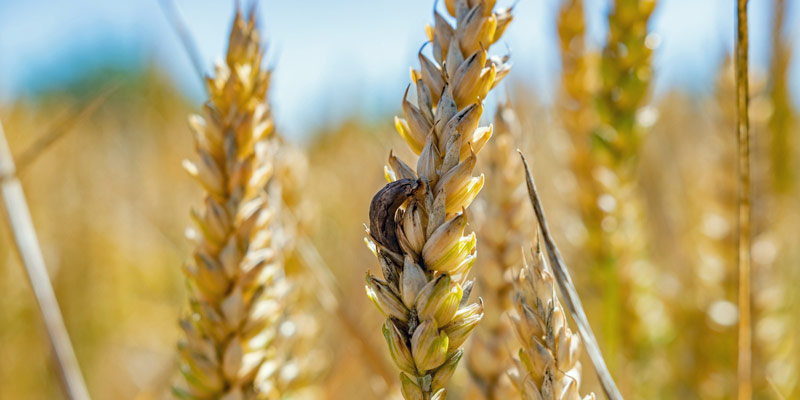AIC Contracts
AIC contracts protect the rights of all parties in an agreement for trade in agricultural goods and services, and are considered the UK standard for trading between parties.

Ergot (Claviceps purpurea) is a fungus which typically infects cereal crops - such as wheat, barley, oats, and rye - and is toxic meaning contaminated grain can be rejected or require thorough cleaning.
Read the below FAQs to find out more about ergot and how the industry manages the feed and food safety risks posed by contaminated grain.
Ergot is more likely to develop in moist conditions and temperatures between 15-26C, but infections can occur even in dry conditions.
There are year-to-year fluctuations in ergot severity that can be explained, to some extent, by variations in weather during flowering.
A longer flowering period gives the disease more time to infect plants, and cool, wet conditions during flowering can also extend the flowering period.
Some modern farming practices offer limited control of ergot, resulting in a greater risk of crop infection.
There can also be large regional variations in severity and work is ongoing to better understand this.
Open pollinating plants are infected in the spring by wind-borne spores predominantly, rain splash and physical contact can also spread the spores.
The ergot fungus then grows in place of the grain to form hard, purple black sclerotium.
While it has little effect on yield, ergot produces toxic alkaloids which can harm both human and animal health if ingested.
Ergot and other mycotoxins, agrochemical residues, and other major contaminants in cereals and co-products are monitored by the industry as part of a rigorous process to ensure food and feed safety.
This due diligence work provides effective assurance for UK crops and their co-products, which is fundamental to maintaining the competitiveness of the UK grain supply chain.
The AHDB wheat and barley disease management guide states that ergot can be effectively managed by using various agronomic best practices.
Both cereal crops and grass weed species, such as blackgrass, can be infected by ergot which produces toxic alkaloids. Ergot can vary in size and shape depending on its host.
While cereal ergot is easily spotted as being larger than the grain it replaces, grass weed ergot is much smaller and comes in a greater range of colours and shapes making it more difficult to identify, requiring different methods of removal.
Growers should always check their merchanting terms and conditions. They should also read carefully the stipulations of the contract that was entered into for the sale of the grain.
If grain exceeds ergot tolerance levels it risks being rejected. Growers should contact their merchant or customer for advice.
If home feeding grains to livestock, use a mobile cleaning service to safeguard animal health.
Agricultural Industries Confederation (AIC) contracts are widely used by grain merchants to stipulate tolerances for ergot and other quality requirements.
All AIC contracts are kept under regular review by the AIC Contracts Committee in conjunction with the relevant sector. Visit the AIC Contracts webpages for full details.
There are two main AIC contracts which cover the trading of combinable crops. In addition, there are AIC contracts which cover combinable crops grown for seed.
Quality: In addition to obligations arising under the Sale of Goods Act 1979 (as amended) the following conditions shall apply:
a. All goods to which this contract refers shall be of satisfactory quality, sound, free from mould, heat damage, green grain, infestation or other injurious materials and from objectionable smell or taste.
b. Feed grain (as specified under Goods sold on Sample/Description above) shall not contain more than 0.001% Ergot by weight. All other goods shall be free from Ergot.
Quality: In addition to obligations arising under the Sale of Goods Act 1979 as amended the following conditions shall apply:
a. All goods to which this contract refers shall be of satisfactory quality, sound, free from mould, heat damage, green grain, infestation or other injurious materials and from objectionable smell or taste.
b. Feed grain (as specified under Goods sold on Sample/Description above) shall not contain more than 0.001% Ergot by weight. All other goods shall be free from Ergot.
19c - Sampling
If the test results indicate that the seed crop cannot meet the Contract standards, or if the sample
contains ergot, injurious weeds, or mature seeds of other weeds, or cereal species, which in the
opinion of The Merchant normal cleaning processes will not bring the sample up to the certification
standards specified in Clause 1, then The Merchant may reject the crop for seed in situ.
20b - Quality Standards
Each and every load delivered by The Grower to The Merchant, or collected by the latter, shall meet the following standards:
The content of ergot, injurious weed seed, other weed seed, other cereal seed, and inert matter, shall not be such that, in the opinion of The Merchant, normal cleaning processes cannot bring the delivery to the certification standards specified.
AIC Services manages a range of trade assurance schemes which support food and feed safety in the UK and Ireland.
The Trade Assurance Scheme for Combinable Crops (TASCC) covers handling, testing, transportation, and storage of combinable crops to protect and build upon the integrity of farm assurance between the farmgate and delivery to the first processor.
Additionally, it verifies that the trade is meeting its obligations under food and feed legislation and associated codes of practice.
The sample must be checked for the presence and identification of contaminants and hazardous impurities.
The following contaminants/hazardous impurities may be found in cereals, pulses and oilseeds. The list is not exhaustive:
Under clause S17.19.a - Only screenings or cleanings produced solely from food/feed from assured food/feed are to be identified as assured.
Under clause S17.19.b - Materials produced during the cleaning process contaminated with Hazardous Impurities must not be used for food/feed use.
TASCC Standard Appendix 23 - Guidance for Intakes (food/feed) and Suppliers (merchants and product stores) Outlining the Action taken after Contaminated Goods are Identified with Hazardous Impurities stipulates strict criteria for the management or ergot and other impurities.
The potential for an end user to accept grain with ergot will depend heavily on the requirements of the individual business and its ability to effectively manage contaminated grain.
For example, most flour mills have zero tolerance of ergot meaning it must be completely removed before it can be marketed. Growers should check merchanting or customer terms and conditions.
A range of effective “cleaning” methods can be used to remove grain infected with ergot. This can either be carried out by a mobile cleaning service on farm, or by the merchant or processor.
This includes gravity separation (with or without an air screen cleaner) and mechanical sieves to remove foreign bodies on the basis of size.
More recently, effective grain colour sorting systems have become available.
Some end users and processors may set their own contractual limits for ergot depending on their individual business requirements.
For guidance on relevant legislation covering the UK, visit the Food Standards Agency website.
The European Union’s legal maximum ergot limit in grain became more stringent in July 2024.
The UK Seed Certification Scheme is a legal requirement to protect farmers and their customers by guaranteeing that all UK certified seed meets prescribed standards for varietal identity and purity, germination and freedom from foreign material.
All purchased seed from a certified merchant/processors will hold a bag label proving this.
There are standards for the number of ergot pieces for certified seed, confirmed by visual inspection:

AIC contracts protect the rights of all parties in an agreement for trade in agricultural goods and services, and are considered the UK standard for trading between parties.